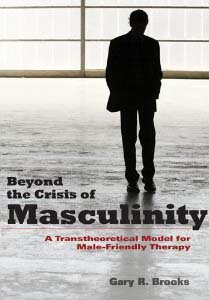Beyond the Crisis of Masculinity: A Transtheoretical Model for Male-Friendly Therapy

Superb book delves into male-friendly therapy
(April 2011 Issue)
“Beyond the Crisis of Masculinity:
A Transtheoretical Model
for Male-Friendly Therapy”
By Gary R. Brooks
American Psychological Association
Washington, D.C., 2011
By Paul Efthim, Ph.D.
Why do men hate therapy, and what can be done about it? In “Beyond the Crisis of Masculinity,” psychologist Gary Brooks tackles this question from both a scholarly and clinical perspective. The whole notion of psychotherapy, he argues, clashes with key elements of male socialization. Most guys find themselves caught between the conflicting demands of the traditional male role (with its focus on control over emotion) and those of the ideal therapy patient.
Moreover, Brooks notes a peculiar irony: “the psychotherapy establishment, despite being historically dominated by men, has largely failed to develop models of psychotherapy that are more harmonious with men’s unique ways of experiencing emotional pain and coping with their psychic distress.” To make matters worse, media portrayals of therapy typically paint a picture of therapy offices populated by a steady stream of losers and wimps, with only rare appearances by “manly” men such as Tony Soprano.
Brooks opens the book with a brief but superb summary of what we know about the social construction of masculinity and the psychopathology of men’s everyday lives. He cites research findings that highlight a troubling pattern of men going it alone: for example, although they typically have a number of “comrades,” many if not most men have few friends and feel lonely, revealing their innermost thoughts and feelings only to one special woman (if to anyone at all).
After articulating how therapy has failed boys and men, the author proceeds to describe a range of “male-friendly” approaches for engaging men who may be open to accepting some form of treatment. One chapter focuses on important primary prevention approaches and working with men in settings outside the office. Another chapter offers guidance on alliance-building and assessing gender role strain during the initial phase of therapy. Along these lines, one might ask a new male patient questions not usually part of diagnostic assessment: What has been the role of work in your life? How important have male friends been in your life? How frustrated are you? Who have been the most important women in your life and why?
Brooks articulates a “transtheoretical model” that incorporates a wide range of possible treatment approaches, including psychodynamic, cognitive, behavioral, interpersonal and other options. The choice about which approach to take is based on assessing where the patient is on Prochaska’s stages-of-change continuum. For example, a precontemplative man – one who tends to externalize blame and minimize concern about the problem at hand – would be a good candidate for understanding how restrictive gender scripts may be impacting his functioning. When he is helped to realize that his problems are not simply the result of personal failures, a male client may feel considerable validation and relief from excessive self-blame. This, in turn, often sets the stage for exploring more hidden emotions.
Brooks points to research which suggests that cognitive and behavioral approaches may be especially effective for men in the opening phases of treatment because of a relative emphasis on thought and action rather than emotion. However, he also argues that catharsis and deepening approaches have an important place in the work once a strong alliance is in place.
A strength of Brooks’ approach (and a weakness of previous work in the men’s studies field) is the emphasis he places on multicultural competence. He devotes a chapter to special issues that arise for men of color, citing research relating to working with specific ethnic and cultural communities. There is also some attention to considerations in working with gay and bisexual men, as well as men with disabilities.
Although Brooks is based at Baylor University in Texas, his text draws on a large body of theory and research on masculinity by a number of prominent New England psychologists, including Jim O’Neil (UConn), Bill Pollack (Harvard), Jim Mahalik (BC), David Lisak (UMass Boston), Ron Levant (formerly at BU), Joe Pleck (previously at Wheaton), Dan Kindlon (Harvard) and Michael Thompson.
This well-written volume is targeted to both a clinical and general readership and is highly recommended.
Paul Efthim, Ph.D. is a licensed psychologist in private practice in Brookline, Mass. and holds a faculty appointment at the Boston Institute for Psychotherapy.
Learn more about the book: Beyond the Crisis of Masculinity: A Transtheoretical Model for Male-Friendly Therapy
